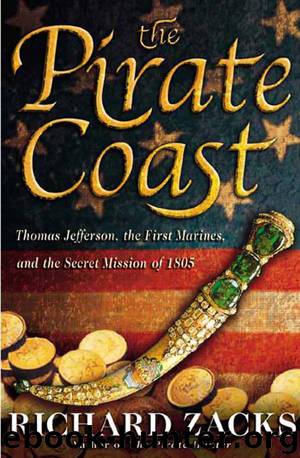The Pirate Coast: Thomas Jefferson, the First Marines, and the Secret Mission of 1805 by Richard Zacks

Author:Richard Zacks
Language: eng
Format: mobi, epub
ISBN: 9781401383114
Publisher: Hachette Books
Published: 2005-06-01T04:30:00+00:00
CHAPTER 14
Tobias Lear: Peace at Any Cost
WHILE JEFFERSON’S SECRET AGENT, Eaton, starved in the desert, Jefferson’s diplomat Tobias Lear lounged in the perfumed gardens of Malta and decided that the time was ripe to reopen peace negotiations with Tripoli. Lear—eager to settle the peace himself—chose to ignore Eaton’s covert mission. If Lear’s advice had been taken, those supply ships would have never gone to Bomba. To Lear’s thinking, tough diplomatic conversations would end the four-year war and bring home the hostages, not some half-baked, dim-witted, far-fetched plot to overthrow Yussef.
The two prongs of American foreign policy—diplomacy and military force—were operating in denial of the other’s existence. Such blinders could lead only to collision or even betrayal. Though neither man expressed it so baldly, their efforts amounted to a race for results. Would Lear negotiate peace before Eaton could place Hamet on the throne? The Bashaw brothers were rivals, and so were the two Americans.
On March 28, a scant two weeks before Eaton reached Bomba, Tobias Lear took time off from the round of diplomatic balls and garden parties to dash off a half-page reply to the Spanish consul, Don Gerando Joseph de Souza, who in the name of the Bashaw had invited Lear to come to Tripoli under a white flag of truce. De Souza’s vague Christmastime message had stated: An honorable peace can now be had.
Lear sealed his answer to De Souza and handed it to the captain of a British ketch, Eliza, which had an American passport to pass through the ongoing American blockade of Tripoli. By replying to De Souza, Lear—in the circuitous way of diplomats—was cracking open the door for peace. “We should not refuse to negotiate . . . upon honourable grounds . . . compatible with the rising character of our nation.” He was hinting that negotiations could perhaps be concluded before the American Navy ships unleashed the huge bombardment that everyone knew was scheduled for the summer. Lear didn’t even deign to mention Eaton-Hamet as a threat to Yussef.
Tobias Lear, whose schedule frequently brought him to dine at the governor’s palace in Malta, sometimes with poet Samuel Coleridge, remained on the British-controlled island to await a reply. Two weeks slipped by pleasantly for Lear and his slender young wife as he awaited an answer from Tripoli.
Around the same time, Captain John Rodgers aboard the USS Constitution off Tripoli received a strange stack of letters. A man in a small boat in the vicinity of the island of Djerba—a place often used for coastal smuggling—had waved down the massive frigate. Two of the letters came from imprisoned Captain Bainbridge, dated March 16 and 22, and one was from the Danish consul, Nicholas Nissen, dated March 18. All three were addressed to Commodore Samuel Barron. For Rodgers, they posed a dilemma. The letters were a month old and might contain vital timely information. Rumors abounded about an escape plot by the American prisoners; maybe they wanted Rodgers to slip a boat shoreward on a given night.
Download
The Pirate Coast: Thomas Jefferson, the First Marines, and the Secret Mission of 1805 by Richard Zacks.epub
This site does not store any files on its server. We only index and link to content provided by other sites. Please contact the content providers to delete copyright contents if any and email us, we'll remove relevant links or contents immediately.
| Africa | Americas |
| Arctic & Antarctica | Asia |
| Australia & Oceania | Europe |
| Middle East | Russia |
| United States | World |
| Ancient Civilizations | Military |
| Historical Study & Educational Resources |
The Radium Girls by Kate Moore(12018)
100 Deadly Skills by Clint Emerson(4921)
Rise and Kill First by Ronen Bergman(4780)
The Templars by Dan Jones(4682)
The Doomsday Machine by Daniel Ellsberg(4484)
The Rape of Nanking by Iris Chang(4203)
Killing England by Bill O'Reilly(3996)
Stalin by Stephen Kotkin(3957)
Hitler in Los Angeles by Steven J. Ross(3942)
12 Strong by Doug Stanton(3541)
Hitler's Monsters by Eric Kurlander(3329)
Blood and Sand by Alex Von Tunzelmann(3195)
The Code Book by Simon Singh(3180)
Darkest Hour by Anthony McCarten(3119)
The Art of War Visualized by Jessica Hagy(3001)
Hitler's Flying Saucers: A Guide to German Flying Discs of the Second World War by Stevens Henry(2752)
Babylon's Ark by Lawrence Anthony(2673)
The Second World Wars by Victor Davis Hanson(2521)
Tobruk by Peter Fitzsimons(2509)
